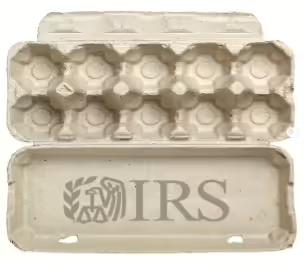The IRS Dirty Dozen
What is the IRS Dirty Dozen list?
A variety of common scams that taxpayers experience anytime (mainly during tax filing season). Knowing these scams can help keep your personal information safe!
 Dirty Dozen
Dirty Dozen
- Fake tax avoidance strategies
- Higher income filers warnings
- Spear phishing attacks
- Tax advice from social media
- Ghost preparers
- Fake charities
- Offer in compromise mills
- False fuel tax credit claims
- “Helpful” Scammers Offering to Set Up Account
- Falsifying the ERC Withdrawal Programv
- Phishing
- Smishing
The Dirty Dozen
- Fake Tax Avoidance Strategies: False charity donations and insurance plans to “save” on taxes.
- Inflated conservation easements to overestimate charitable donations and false micro captive insurance arrangements in which the owners do not get taxed on premiums paid.
- Higher Income Filers Warning: improper art donation deductions, charitable remainder annuity trusts, and monetized installment sales.
- Improper Art Donation Deductions: Process of buying discounted art and claiming it’s worth higher when they donate it leading to inflated tax deductions.
- Charitable Remainder Annuity Trusts: Type of trust (CRAT) to avoid paying taxes on capital gains and claiming false benefits when selling assets.
- Monetized Installment Sales: Monetized installment sales in which promoters help sell property, but delay paying taxes on the property for years.
- Spear Phishing Attacks: Scammers send fake emails to clients to trick tax professionals into clicking on the link or attachment to give the scammers access to client data.
- Tax Advice from Social Media
- Ghost Preparers: tax preparer who doesn’t sign tax returns they prepare
- Some warning signs: shady fees (cash only payment and/or percentage of taxpayer’s refund is their service fee), false income, and wrong bank account (deposit the taxpayer’s refund in their bank account instead of taxpayers)
- Fake Charities: Solicit money and information to victimize individuals through identity theft
- Tips to avoid scam: use Tax-Exempt Organization Search at the IRS’s website to check validity
- Offer in Compromise Mills: make exaggerated claims through radio and TV ads about settling tax debts for less
- Reality of situation: charge excessive fees and taxpayer could have obtained this service by talking to the IRS
- False Fuel Tax Credit Claims: falsifying Form 4136 Credit for Federal Tax Paid on Fuels that causes taxpayers to pay inflated fees
- Fuel Tax Credit: only available for off highway business and farming use
- “Helpful” Scammers Offering to Set Up Online Account: scammers pose as helpful third party software used to set up taxpayer’s online IRS account (irs.gov)
- Scammers try to get personal information including Social Security numbers, Taxpayer Identification Number (ITIN), and photo identification
- Taxpayers should set up their own account using the IRS Account Online Account at irs.gov (IRS Online Tool)
- Falsifying the ERC Withdrawal Program: This program allows employers that file an ERC claim but have not received their refund to withdraw and avoid future repayment, interest, and penalties. This is designed to help small business owners and those who were misled by scammers during the ERC process.
- Warning signs to look out for:
- Too many quarters being claimed
- Government orders do not qualify
- Too many employees/wrong calculation
- Business citing supply chain issues
- Business claiming the ERC for too much of a tax period
- Business did not pay wages or did not exist
- Warning signs to look out for:
- Phishing: email sent by fraudsters claiming to come from the IRS
- Smishing: text where scammers use language such as “Your account has now been put on hold” or “Unusual Activity:”
Note: This information is for general education purposes and should not be considered legal advice. Tax situations can vary significantly, and specific advice is required. If you have any questions or need assistance with a tax matter, please contact a tax professional, contact the Low Income Taxpayer Clinic, or seek help from a private attorney.
References:
https://www.irs.gov/newsroom/dirty-dozen
